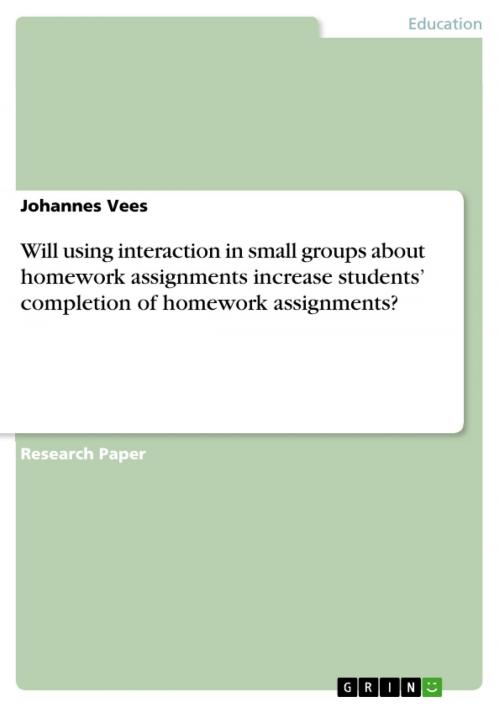Will using interaction in small groups about homework assignments increase students' completion of homework assignments?
Nonfiction, Reference & Language, Education & Teaching| Author: | Johannes Vees | ISBN: | 9783640508549 |
| Publisher: | GRIN Publishing | Publication: | January 13, 2010 |
| Imprint: | GRIN Publishing | Language: | English |
| Author: | Johannes Vees |
| ISBN: | 9783640508549 |
| Publisher: | GRIN Publishing |
| Publication: | January 13, 2010 |
| Imprint: | GRIN Publishing |
| Language: | English |
Research Paper (postgraduate) from the year 2007 in the subject Pedagogy - General, grade: 1,0, Samford University (Orlean Bullard Beeson School of Education & Professional Studies), course: The professional secondary language Arts/English teacher, language: English, abstract: This paper is part of an observation as a clinical experience requirement of the course listed on the title page. It takes place at a High School in a 10th grade history class under Mr.E.'s leadership. The class, which I attend twice a week for one period, consists of 16 students (eight of them are male, eight female). As far as I'm concerned, I am a German exchange student spending one semester at Samford University with the main objective of improving my English since I'm going to be a secondary school teacher back in Germany. English is - alongside with German and Physical Education - one of the subjects that I'm going to teach. This semester is my fourth one, so I would be pretty much a sophomore in the American Educational System. However, the German Educational System works quite differently which is the reason for still having approximately four years of study to complete. Before being able to start an action research, the researcher has to identify a research question. It is raised the question which matters could be of interest. After having led a conversation with my mentor about an interesting field of investigation, we came to the conclusion that the completion of homework was an important concern. He told me about his difficulties in coping with this problem in 10th grade in history. He was willing to figure out a solution to the apparently big problem. Since some students don't do any homework at all regularly, it is definitely a problem worth taking into focus. There are multiple ways to deal with unsatisfactory homework behavior of students. Punishment in form of extra work is probably one of the most common means to encounter it. Yet, multiple generations of teachers have already applied this measure, but the problem has, quite obviously, not vanished. Therefore, this method doesn't seem to work appropriately. This is, in my opinion, due to the fact that students are only extrinsically motivated in this case. Another example of extrinsic motivation is rewarding. Yet it may be helpful in some cases, it is still a means of extrinsic motivation and therefore not last perpetual wisdom. Extrinsic motivation is not a long-ranging solution to the problem. There are other options to take.
Research Paper (postgraduate) from the year 2007 in the subject Pedagogy - General, grade: 1,0, Samford University (Orlean Bullard Beeson School of Education & Professional Studies), course: The professional secondary language Arts/English teacher, language: English, abstract: This paper is part of an observation as a clinical experience requirement of the course listed on the title page. It takes place at a High School in a 10th grade history class under Mr.E.'s leadership. The class, which I attend twice a week for one period, consists of 16 students (eight of them are male, eight female). As far as I'm concerned, I am a German exchange student spending one semester at Samford University with the main objective of improving my English since I'm going to be a secondary school teacher back in Germany. English is - alongside with German and Physical Education - one of the subjects that I'm going to teach. This semester is my fourth one, so I would be pretty much a sophomore in the American Educational System. However, the German Educational System works quite differently which is the reason for still having approximately four years of study to complete. Before being able to start an action research, the researcher has to identify a research question. It is raised the question which matters could be of interest. After having led a conversation with my mentor about an interesting field of investigation, we came to the conclusion that the completion of homework was an important concern. He told me about his difficulties in coping with this problem in 10th grade in history. He was willing to figure out a solution to the apparently big problem. Since some students don't do any homework at all regularly, it is definitely a problem worth taking into focus. There are multiple ways to deal with unsatisfactory homework behavior of students. Punishment in form of extra work is probably one of the most common means to encounter it. Yet, multiple generations of teachers have already applied this measure, but the problem has, quite obviously, not vanished. Therefore, this method doesn't seem to work appropriately. This is, in my opinion, due to the fact that students are only extrinsically motivated in this case. Another example of extrinsic motivation is rewarding. Yet it may be helpful in some cases, it is still a means of extrinsic motivation and therefore not last perpetual wisdom. Extrinsic motivation is not a long-ranging solution to the problem. There are other options to take.















